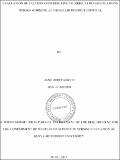| dc.description.abstract | Kenya healthcare policies provide that patient's dignity be observed by ensuring medical safety practices are observed. In this case, medication errors are a concern for both healthcare professionals as well as patients. The main aim of this study was to evaluate factors contributing to medication safety practices among nurses working at Mbagathi District Hospital. To achieve this objective, the study investigated types of medication errors committed by nurses, established actual factors contributing to occurrence of medication errors, among nurses and finally established the barriers to reporting of medication errors among nurses working at Mbagathi District Hospital. The study adopted descriptive design study where data was collected from 121 nurses working in medical, surgical, paediatric, maternity and outpatients using structured self-administered questionnaires after a pilot study showed validity and reliability of the research instrument. Basically, to ensure that the sample was representative, respondents were stratified in to 6 strata to ensure all departments are represented and simple random was used to select the wards and participants. The data collected was cleaned and analysis was done using scientific package for social scientist (SPSS) version 20. Descriptive statistics such as means, standard deviations and frequency distribution were used to analyse the data while inferential statistics such as Chi-Square, Person Correlation, ANOVA and Regression analysis were used to tests relationships between independent variables and dependent variables. The results indicated that there exist a statistically significant positive relationship between errors made during drug administration and such errors occurred as a result of environmental factors human factors, system factors and failure to reporting previous errors. Result indicated an error rate per as 6.2. Meaning for every six patients seeking health care one patient suffers a medication error. Nurses perceive that most important barriers of reporting medication errors were fear of punishment, fear of being reprimand and fear of lawsuit. There was complacency in ensuring medication safety practices are adhered, this was further contributed by human, environmental and system factors. There was gap between medication made by nurses and reporting of those medication errors, hence the need by hospital management to put in place measures to promote medication safety practices among nurses. The study concludes that medical safety practices are not well adhered at Mbagathi District hospital and thus hospital management need to deal with all barriers that limit error reporting through creating proper communication channel for relaying information. | en_US |

